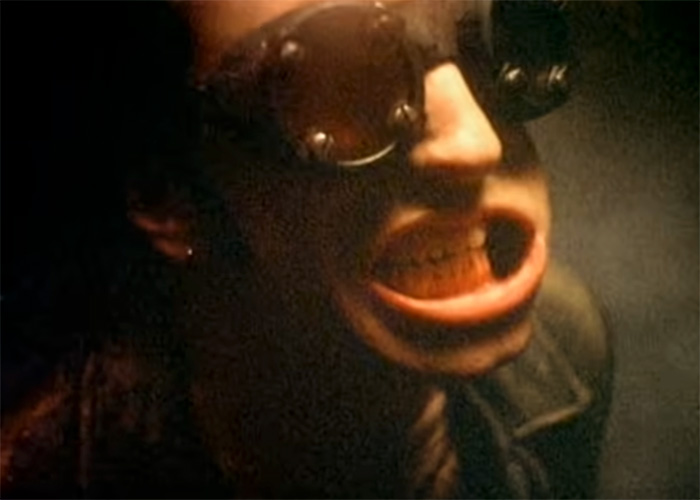
Industrial rock pioneers Nine Inch Nails have produced some of the most intense and influential music of the past 30 years.
With their heavy synths, anguished lyrics, and dynamic song structures, NIN tapped into the darkness of the human condition like few other acts.
As Trent Reznor continues to evolve his influential project, we look back on NIN’s best songs to date.
“Head Like a Hole”
The breakout single from Nine Inch Nails’ 1989 debut Pretty Hate Machine, “Head Like a Hole” encapsulates everything that made early NIN so impactful.
Trent Reznor’s snarling vocals and the song’s relentless, mechanical groove captured youthful angst and anger. Lines like “Bow down before the one you serve/You’re going to get what you deserve” felt cathartically defiant for disaffected listeners.
Though synth-heavy, NIN brought an industrial edge to 80s pop. The crunching guitars, punchy drums, and minor-key melodies of “Head Like a Hole” were abrasively hypnotic.
It was both viscerally charged and catchy, setting NIN apart from pop and rock peers. Though Reznor would expand his palette, “Head Like a Hole” distills his early brilliance into one angry anthem.
Uncompromising yet accessible, confrontational yet danceable, it made NIN harbingers for 90s alt-rock. The song’s staying power proves its timeless angst resonates regardless of era. For many, “Head Like a Hole” was an intoxicating introduction to NIN’s dark glory.
“We’re In This Together”
“We’re in This Together” stands as a monumental track in Nine Inch Nails’ illustrious discography. From the opening drum beats to the soaring chorus, the song encapsulates Trent Reznor’s unparalleled ability to meld raw emotion with intricate soundscapes.
Unlike many of NIN’s tracks that delve into the depths of despair, “We’re in This Together” offers a glimmer of unity and hope, suggesting a bond that’s unbreakable even in the face of adversity.
The track’s pulsating rhythm and anthemic chorus make it not just a song, but an experience, resonating with listeners on a deeply personal level.
Reznor’s haunting vocals, paired with the song’s poignant lyrics, capture the essence of commitment and solidarity.
In a catalog filled with introspective and often somber tracks, “We’re in This Together” shines as a testament to Nine Inch Nails’ versatility and Reznor’s genius. It’s not just a song; it’s an anthem for all who have ever felt the strength of unity in trying times.
“Closer”
The standout track on Nine Inch Nails’ seminal 1994 album The Downward Spiral, “Closer” shows Trent Reznor at his creative peak. Though the album is full of angst and aggression, “Closer” brings a dark sexuality and slinky groove.
With its funky bassline, disco beats, and whispered vocals, “Closer” has a sinister dancefloor appeal that was years ahead of its time. Its sexually provocative lyrics courted controversy, but also made it Reznor’s biggest hit.
While other Nine Inch Nails songs rely on noise and distortion, “Closer” has a restraint that makes it subtly unnerving. Its stripped-down arrangement highlights Reznor’s gift for dynamics and texture.
“Closer” proved Nine Inch Nails could be seductive as well as abrasive, expanding their sonic palette. Though Reznor has created other great songs, “Closer” remains one of his masterpiece – a perfect distillation of what makes Nine Inch Nails so compelling even decades later.
“Hurt”
Though an anomaly on Nine Inch Nails’ abrasive 1994 album The Downward Spiral, the hushed ballad “Hurt” has become one of Trent Reznor’s most iconic songs.
Its gentle piano and acoustic guitar create a melancholy backdrop for Reznor’s vulnerable vocals as he contemplates pain and regret.
Lines like “I hurt myself today/To see if I still feel” capture self-loathing and despair. Yet the song avoids sounding melodramatic through its starkness and maturity. Reznor’s songwriting subtly conjures profound sadness rather than angsty excess.
While much early NIN relied on noise, “Hurt” gets under your skin through restraint.
This emotional power was confirmed when Johnny Cash covered it near his death. The old man embodied the song’s world-weariness perfectly.
Though diverging from NIN’s industrial harshness, “Hurt” proved Reznor could craft damaged beauty. Its vulnerability resonated widely.
For many, “Hurt” remains the Nine Inch Nails song that cuts deepest, utterly heartbreaking in its laid-bare humanity.
“Wish”
“Wish,” a standout track from Nine Inch Nails’ “Broken” EP, is a raw, unfiltered dive into Trent Reznor’s psyche. The song’s aggressive guitar riffs and relentless percussion exemplify NIN’s signature industrial sound, while its lyrics offer a searing exploration of anger and defiance.
“Wish” stands out not just for its sonic intensity, but for its ability to encapsulate the angst and rebellion of an entire generation.
The iconic line, “I’m the one without a soul, I’m the one with this big f***ing hole,” resonates as a battle cry, echoing the disillusionment and frustration many felt during the era.
Reznor’s masterful blend of chaotic instrumentation with piercing lyrics earned “Wish” a Grammy for Best Metal Performance, further cementing its place in rock history. In the vast landscape of Nine Inch Nails’ work, “Wish” remains a testament to Reznor’s brilliance, capturing a moment in time while remaining timeless in its ferocity and impact.
“March of the Pigs”
The kinetic lead single from Nine Inch Nails’ 1994 album The Downward Spiral, “March of the Pigs” exemplifies Trent Reznor’s talent for unrelenting industrial-rock.
Its propulsive beat and dissonant pianos create a sense of claustrophobic mania. Reznor’s screamed vocals exude rage and disgust, railing against demons both internal and in society.
The song walks a razors edge between chaos and control that remains exhilarating decades later.
Though layered with abrasive electronics and noise, “March of The Pigs” reveals Reznor’s pop sensibility in its dark melodies.
The track also showcases his innovative fusion of rock aggression and dance music. Its hip-hop inspired beats helped push industrial into the mainstream.
Both brutally raw and carefully crafted, “March of The Pigs” captures Nine Inch Nails’ peculiar alchemy. It distills the wild abandon and artistic meticulousness that made NIN such a singular force in 90s alternative music.
For many fans, “March of the Pigs” is the essential NIN track, the perfect storm of their seething power.
“Terrible Lie”
“Terrible Lie,” a standout track from Nine Inch Nails’ debut album “Pretty Hate Machine,” is a masterclass in Trent Reznor’s ability to fuse raw emotion with groundbreaking industrial soundscapes.
The song’s pulsating beats and layered synths create a haunting backdrop for Reznor’s desperate pleas for truth and clarity. Lyrics like “Don’t take it away from me, I need someone to hold on to” resonate as a heart-wrenching cry against betrayal and deception.
“Terrible Lie” is more than just a song; it’s an experience that delves deep into the psyche, exploring themes of faith, disillusionment, and the human need for connection.
“Reptile”
Reptile,” a standout track from Nine Inch Nails’ seminal album “The Downward Spiral,” is a haunting exploration of degradation and dehumanization.
The song’s chilling atmosphere, crafted through a blend of industrial beats, distorted synths, and Trent Reznor’s visceral vocals, creates a soundscape that is both unsettling and captivating.
Lyrics like “Oh my beautiful liar, oh my precious whore” delve into themes of betrayal, self-loathing, and the darker aspects of human nature.
“Reptile” stands as a testament to Reznor’s ability to craft songs that are not only musically innovative but also thematically profound.
Its raw intensity, combined with its layered sonic textures, showcases Nine Inch Nails’ signature blend of industrial might and emotional depth.
In the vast and varied landscape of NIN’s work, “Reptile” remains a defining track, emblematic of the band’s fearless exploration of the human psyche and its unparalleled ability to merge sound and sentiment.
“The Wretched”
“The Wretched,” a standout track from Nine Inch Nails’ ambitious double album “The Fragile,” exemplifies Trent Reznor’s mastery in crafting sonic landscapes that are both expansive and deeply introspective.
The song’s intricate layers of distorted guitars, pulsating synths, and haunting vocals create a soundscape that is simultaneously chaotic and controlled. Reznor’s lyrics, laden with themes of decay and disillusionment, resonate as a poignant reflection on the human condition.
“Now you know, this is what it feels like” serves as a chilling refrain, encapsulating the song’s exploration of despair and hopelessness.
Yet, amidst the bleakness, “The Wretched” stands as a testament to Nine Inch Nails’ ability to find beauty in the abyss. Its complex instrumentation and profound lyrical depth showcase the band’s signature blend of industrial grit and emotional resonance.
"The Hand That Feeds"
“The Hand That Feeds,” a pivotal track from Nine Inch Nails’ album “With Teeth,” is a brilliant fusion of Trent Reznor’s industrial roots with a more accessible rock anthem sensibility.
The song’s infectious rhythm, combined with its razor-sharp guitar riffs, makes it an instant earworm, while its politically charged lyrics offer a biting commentary on conformity and the dangers of blind obedience.
“Will you bite the hand that feeds you? Will you stay down on your knees?” Reznor challenges, prompting listeners to question authority and the status quo.
This track not only showcases Nine Inch Nails’ musical evolution but also cements Reznor’s reputation as a fearless social commentator.
Its blend of catchy melodies with thought-provoking lyrics exemplifies the band’s ability to create tracks that are both commercially successful and artistically significant.
Even after decades, Nine Inch Nails continue to make provocative industrial music full of pain and catharsis. Though the project has gone through various incarnations, Reznor’s uncompromising vision has kept the music raw and relevant.

